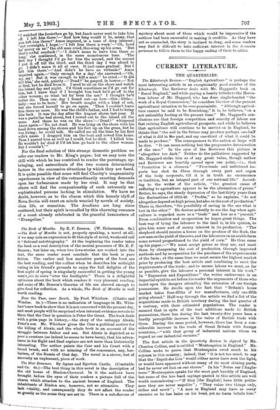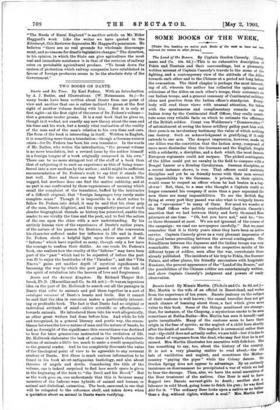C URRENT LITERAT URE.
THE QUARTERLIES.
The Edinburgh Review.—" English Agriculture " is perhaps the most interesting article in an exceptionally good number of the Edinburgh. The Reviewer deals with Mr. Haggard's book on " Rural England," and while paying a hearty tribute to the Hercu- lean labour of Mr. Haggard, who has done single-handed "the work of a Royal Commission," he considers his view of the present agricultural situation to be over-pessimistic. "Although agricul- ture cannot be said to be flourishing," it is, he believes, " on a not unhealthy footing at the present time." Mr. Haggard's con- clusions are that foreign competition and scarcity of labour are fast ruining English agricultural prospects, and while he believes that agriculture will continue to be carried on in England, he thinks that " the soil in the future may produce perhaps one-half of what it did in the past, and say one-third of what it could be made to produce." The consequences to the nation at large will be dire. " It can mean nothing but the progressive deterioration of the race." In the eyes of the Reviewer this picture is "altogether too dark." Neither do the palliatives suggested by Mr. Haggard strike him as of any great value, though author and Reviewer are heartily agreed upon one point,—i.e.. that "Protection is a chimera." "Free-trade and unfettered im- ports has shot its fibres through every part and organ of the body corporate, till it is in truth no excrescence or tradition, but an integral part of our national life." Accord- ing to the writer of the article, "the greatest cause of suffering to agriculture appears to be the alternation of prices." Better, he says, the steady depression of the last thirty years than the fluctuations of 1812-42. " Profits," as he explains, " do not altogether depend on high prices, but also on the cost of production." There is, therefore, "the possibility of saving in the one what is lost in the other." He desires ardently to see the day when agri- culture is regarded more as a "trade" and less as a "pursuit" From combination and co-operation he hopes great things. The best way of tying the labourer to the land is, in his opinion, to give him some sort of money interest in its production. "The shepherd should receive a bonus on the produce of the flock, the • cow man on the yield of the cows, and the labourers on an arable farm some reward proportioned to the yield of corn." He thus sums . np his paper:—" We must accept prices as they are, and meet them by cheapening the cost of production through improved methods and by co-operation for the purchase of the requirements of the farm ; at the same time we must secure the highest market price by producing the best article and combining to meet the requirements of the trade; and to secure labour we must, as far as possible, give the labourer a personal interest in his work." In " Expansion and Expenditure" the writer endeavours in an impartial spirit to set before his reader the arguments of those who insist upon the dangers attending the extension of our foreign possessions. He dwells upon the fact that "Britain's home market takes four-fifths of her manufactures, only one-fifth going abroad." Half-way through the article we find a list of the acquisitions made to British territory during the last quarter of a century, with their estimated populations. The reader is assured that in spite of the vast additions made to British possessions, there has during the last twenty-five years been a hardly perceptible increase in the value of British trade with them. During the same period, however, there has been a con- • siderable increase in the trade of Great Britain with foreign countries,—" with that group of industrial nations whom we regard as our industrial enemies."
The first article in the Quarterly Review is signed by Mn. Churton Collins, and is entitled " Montesquieu in England." Mr.-. Collins seeks to prove that Montesquieu owed much to his.: sojourn in this country ; indeed, that " it is not too much to say that the Esprit des Lois ' would either never have seen the light, or would have appeared without many of its most shining parts, had he never set foot on our shores." In his "Notes sur l'A nee- terre " Montesquieu speaks for the most part harshly of England, but some of the less hard sayings quoted in this article are well worth remembering :—" If they [the English] have little polite- ness they are never unpolite" ; "They value two things only, riches and merit " ; "A man in England may have as many enemies as he has hairs on his head, yet no harm befalls him," "The Needs of Rural England" is another article on Mr. Rider Haggard's work. Like the writer we have quoted in the Edinburgh, this Reviewer deprecates Mr. Haggard's pessimism. He believes "there are no real grounds for wholesale discourage- ment, and no reasons for drastic legislative changes." The direction, in his opinion, in which the State can give agriculture the most real and immediate assistance is in that of the revision of railway rates on perishable agricultural produce. "To break down the system of protection which railway companies have established in favour of foreign producers seems to be the absolute duty of the Government."











































 Previous page
Previous page